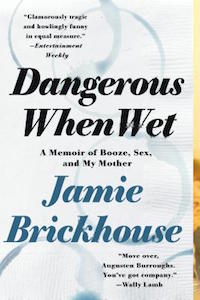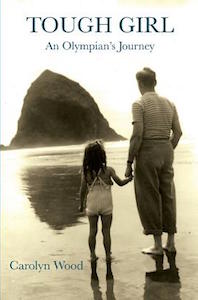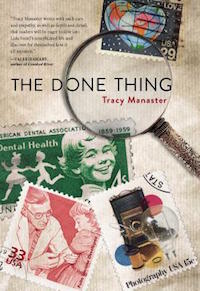Some authors know their title before they even start writing the book, but if you struggle to find the right title, you’re not alone. Help with the title is one of the most common add-on requests I receive from clients who’ve worked with me for editing.
Here are the four tips I often give to clients who are searching for just the right title for their literary memoir, novel, or short story:
1. Revisit your manuscript’s pivotal scenes—the inciting incident, the midpoint climax, the climax, and the resolution. Watch for metaphors that naturally worked their way into your descriptions, especially as related to how your main character changes over the course of the book.
 A great title example is Dangerous When Wet: A Memoir of Booze, Sex, and My Mother by Jamie Brickhouse. The main title is also the title of the climax chapter in which Jamie realizes his lifestyle has become dangerous.
A great title example is Dangerous When Wet: A Memoir of Booze, Sex, and My Mother by Jamie Brickhouse. The main title is also the title of the climax chapter in which Jamie realizes his lifestyle has become dangerous.
2. In those same pivotal scenes, reexamine the dialogue. Often, our characters have a way of encapsulating the overarching themes in just a few words.
In my short creative nonfiction piece “Going Home,” published in the anthology Celebrating Animal Rescue, the shelter staff sings “Henry’s going ho-ome” when I adopt a dog who’s been returned to them repeatedly. This line plays out later when Henry is injured, his prognosis is uncertain, and I’m finally able to bring him home again.
3. Try a writing exercise in which you have your main character sit down with a person who represents your target audience. How would your main character describe himself in four or fewer words?
 Carolyn Wood, author of the memoir Tough Girl: An Olympian’s Journey, often tells the story of taking a writing workshop in which the participants were asked what they wanted their children or grandchildren to know about them. Carolyn imagined a granddaughter—she had no grandchildren yet—and decided she wanted her to know that she was tough. Now Carolyn’s granddaughter is two, and there’s no question that she will learn about her grandmother’s journey to the Olympics, among many other sojourns, and know that she is tough.
Carolyn Wood, author of the memoir Tough Girl: An Olympian’s Journey, often tells the story of taking a writing workshop in which the participants were asked what they wanted their children or grandchildren to know about them. Carolyn imagined a granddaughter—she had no grandchildren yet—and decided she wanted her to know that she was tough. Now Carolyn’s granddaughter is two, and there’s no question that she will learn about her grandmother’s journey to the Olympics, among many other sojourns, and know that she is tough.
4. Finally, meditate and brainstorm. Close your eyes and focus on your breath for at least three deep breaths. Now bring your attention to your feet and slowly move it up to your legs, stomach, chest, shoulders and arms, and then head. Now ask yourself: What is the feeling I want my reader to walk away with? Feel it in your body and in your deeper emotional sense. Write down every word or phrase related to that feeling—no censoring! You might be surprised at the honest images that emerge from this process.
 My favorite novel title that encapsulates the feeling the reader will carry is The Done Thing by Tracy Manaster. While probably not many people have done the thing that Lida Stearl does, we can all relate with that moment of realizing we’ve taken an action that can never be taken back.
My favorite novel title that encapsulates the feeling the reader will carry is The Done Thing by Tracy Manaster. While probably not many people have done the thing that Lida Stearl does, we can all relate with that moment of realizing we’ve taken an action that can never be taken back.
When you’ve gathered a few titles that speak to the overall feel, message, or theme of your plot or character, you can continue to toy with wording to create the strongest title with memorable alliteration, metaphor, and depth of experience.
But what happens if another book already has your perfect title?
About 1 million books are published every year, so repetition is common. It’s important to remember that a title cannot be copyrighted. Only the presentation of the book—that is, the exact wording of how you present your story—can be copyrighted. In some cases, titles may be trademarked, but this typically only happens with how-to or self-help nonfiction books in which the author has a business name that is trademarked and shares the name with the book. In the genres of literary memoir and fiction, there are likely no legal implications of having the same title as another book.
Still, you don’t want your readers to accidentally buy another book when they’re looking for yours. Consider: What genre is the other book? When was it published? Will readers easily mistake that book for yours? If it’s the same genre and was published recently, keep brainstorming. Otherwise, it’s safe to assume that readers of Tobias Wolff’s memoir This Boy’s Life won’t accidentally buy the novel Boy’s Life by thriller writer Robert R. McCammon.
Happy title hunting!

Recent Comments